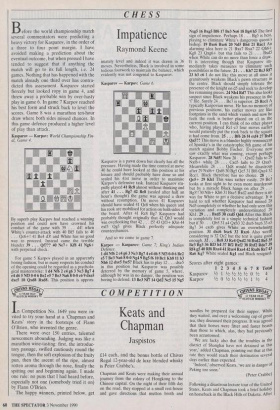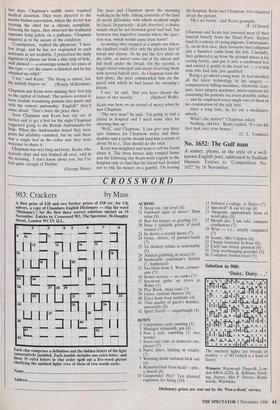c oNTAS REG A
12 YEAR OLD SCOTCH WHISKY
COMPETITION
evAVAS REGAL
12 YEAR OLD SCOTCH WHISKY
Keats and Chapman
Jaspistos
In Competition No. 1649 you were in- vited to try your hand at a 'Chapman and Keats' story in the footsteps of Flann O'Brien, who invented the genre.
There were over 150 entries, talented newcomers abounding. Judging was like a marathon wine-tasting: first, the introduc- tory passage, swilled cautiously round the tongue, then the soft explosion of the fruity pun, then the ascent of the ripe, almost rotten aroma through the nose, finally the spitting out and beginning again. I made one rule: no puns that I had heard before, especially not one (somebody tried it on) by Flann O'Brien.
The happy winners, printed below, get £14 each, and the bonus bottle of Chivas Regal 12-year-old de luxe blended whisky is Peter Crabbe's.
Chapman and Keats were making their annual journey from the colony of Hongkong to the Chinese capital. On the night of their fifth day on the road, they stopped at a small rest-house and gave directions that mutton broth and
noodles be prepared for their supper. While they waited, and over a welcoming cup of green tea, they discussed their progress. It was agreed that their horses were fitter and faster beasts than those to which, alas, they had previously been accustomed.
`We are lucky also that the troubles in the district of Shanghai have not detained us this year,' added Chapman, pointing out that at this rate they would reach their destination several days earlier than expected.
`Indeed,' observed Keats, 'we are in danger of Peking too soon.'
(Peter Crabbe)
Following a disastrous lecture tour of the United States, Keats and Chapman took a brief holiday on horseback in the Black Hills of Dakota. After,
two days, Chapman's saddle sores required medical attention. They were directed to the nearby Indian reservation, where the doctor was treating the chief for a chronic complaint. Entering the tepee, they observed the feathered supremo lying palely on a palliasse. Chapman inquired as to the nature of the condition.
'Constipation,' replied the physician. 'I have few drugs, and he has not responded to such nostrums as are available. I prescribed the daily ingestion of pieces cut from a thin strip of hide, well chewed — a sovereign remedy for cases of this type — yet the course is finished and he has obtained no relief.'
`i see,' said Keats. 'The thong is ended, but the malady lingers on.' (Wendy McKechnie) Chapman and Keats were making their first trip to the capital of Ireland. The natives seemed to have trouble translating pounds into punts and with the visitors' nationality. 'English?' they'd muse aloud. 'That's twice the price then.'
Soon Chapman and Keats had run out of money and to get a bed for the night Chapman suggested going to the British Ambassador for help. When the Ambassador heard they were Poets his affability vanished, but he said there was a single bed in the cellar and they were welcome to share it.
Chapman was very long and bony. Keats, who scarcely slept and was bruised all over, said in the morning, 'I don't know about you, but I've had quite enough of Dublin.' (George Moor) The poet and Chapman spent the morning walking in the hills, talking earnestly of the kind of moral difficulties with which mankind might be faced. In particula-, Keats observed, a choice would often lie not between good and bad, but between two imperfect courses where the ques- tion was, which would cause least harm?
At midday they stopped at a simple inn where the landlord could offer only the plainest fare of bread and cheese. As he put the first plate on the table, an insect came out of the cheese and hid itself under the bread. On the second, a larger insect emerged and stood observing them with several baleful eyes. As Chapman took the first plate, the poet commended him on the speed with which he had learnt the morning's lesson.
'I see,' he said, 'that you have chosen the lesser of two weevils.' (Richard Wells) Keats was bent on an errand of mercy when he met Chapman.
`The very man!' he said. 'I'm going to visit a friend in hospital and I need some idea for cheering him up.' `Well,' said Chapman, `I can give you three sure winners for Chepstow today and three doubles and a treble should land him a return of about 50 to I. That should do the trick.'
Keats was delighted and went to tell his friend about it. The three horses duly romped home and the following day Keats went eagerly to the hospital only to find that his friend had decided not to risk his money on a gamble. On leaving the hospital, Keats met Chapman, who inquired about the patient.
'He's no better,' said Keats grumpily.
(F. O'Dowd) Chapman and Keats had invested most of their funeral benefit from the Dead Poets' Society fund in a colony of racing pigeons. Unfortunate- ly, on its first race, their favourite bird collapsed just a hundred yards from the loft. Carefully, they gathered it up from the ground where it lay cooing feebly, and put it into a cardboard box and carried it gently to the local vet — a young man who had only just qualified.
Being a go-ahead young man, he had installed all the latest technology in his surgery computerised billing-machines, electronic scan- ners, laser-surgery machines, micro-cameras for examining his patients via every possible orifice — and he employed every single one of them in his examination of the sick bird.
After a long time, he let out a meditative whistle.
'What's the matter?' Chapman asked. 'Nothing, old boy,' Keats replied. 'It's just his first look into your homer.'
(C. L. Tomkins)



































































 Previous page
Previous page